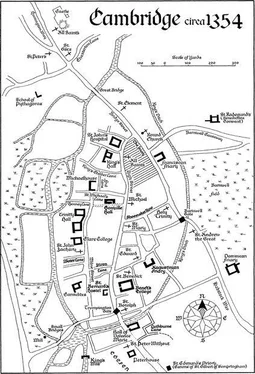‘But that is not fair,’ protested William, crestfallen. ‘I have been waiting years to be appointed, and you must appreciate that I would be good at ferreting out criminals, killers and heretics. I am the right man for the task, and you know it!’
‘You would make a memorable proctor,’ said Michael ambiguously. ‘I will tell Chancellor Tynkell of your interest. However, it is my understanding that he has promised the position to someone else.’
‘Who?’ demanded William. ‘I warrant it will not be someone with my dedication and experience.’
‘You are probably right,’ said Michael soothingly.
William rubbed his chin thoughtfully, then apparently decided to make the best of the situation. ‘But until this person has officially accepted the position, you will need someone to help you,’ he said. ‘It will be good practice for when the new Junior Proctor resigns and I take his place.’
‘That will not be necessary,’ said Michael hastily. ‘Matt is assisting me, and I need no one else. And anyway, I anticipate that Walcote’s replacement will take up his duties very soon.’
‘You need me,’ stated William uncompromisingly. ‘You see, this is not merely a matter of hunting down some criminal who has killed a man – which is all you have done in the past. This is far more complex: it is a case of unmasking a heretic.’
‘I see,’ said Michael, as William folded his arms and pursed his lips in the way he always did when he thought he had made an astute revelation. ‘And how have you arrived at this conclusion, pray?’
‘It is obvious,’ said William, inserting his solid form through the door and perching on the windowsill when he saw Michael was prepared to listen to him. ‘Walcote was an Austin canon; Austin canons follow the theory of nominalism; nominalism is an heretical notion; heretical notions are upheld by agents of the Devil. Ergo , you need a man like me to discover the Devil’s spawn who killed Walcote.’
‘There is a flaw in your logic, Father,’ said Michael. ‘If Walcote were one of these so-called heretics, why would another heretic kill him? Surely, the killer would be more likely to strike at a realist than a nominalist?’
William’s convictions began to waver. ‘Not necessarily,’ he blustered. ‘Heretics do not think in the same way as you or I. They do not always act logically.’
‘And neither do Franciscan fanatics,’ muttered Michael, eyeing the friar in distaste.
‘You are a realist, are you?’ asked Bartholomew, surprised that William was prepared to take a stand on an issue that was so complex. Normally the Franciscan had little time for intricate debates that required serious thinking.
‘We Franciscans always follow the path of truth,’ announced William. ‘Of course we support realism. You did not think we were nominalists, did you? My Prior told me that the Franciscans supported realism, and I always follow his lead in such matters.’
Michael gave a low snort of laughter. ‘Only when it suits you. He told you not to fan the flames of dissent between your Order and the Dominicans last summer, and you were brought before him three times for disobeying his instructions.’
‘That was different,’ said William haughtily. ‘And anyway, he now recognises that I was right. We should have driven the Dominicans out of Cambridge last year, when I suggested we should.’
‘You mean we should suppress anything we do not agree with, and persecute anyone who holds a different opinion from us?’ asked Bartholomew, raising his eyebrows in amusement.
‘That is the most sensible suggestion I have ever heard you make, Matthew,’ said William, oblivious of the fact that the physician had been joking. ‘Then we would eradicate heresy from the face of the Earth.’
‘Along with the freedom to think,’ said Bartholomew. ‘But why are the religious Orders laying down such rigid rules regarding the nominalism – realism debate? In the past, they have always permitted individuals to make up their own minds about philosophical issues.’
‘Not everyone is equipped with the wits to make a rational decision,’ said William in a superior manner. ‘Like the Dominicans, apparently.’
‘And why do you think nominalism is so wrong?’ asked Bartholomew curiously.
‘It is wrong because it is heretical,’ said William immediately.
‘Yes, but why is it heretical?’ pressed Bartholomew.
‘Because it is,’ said William. ‘Everyone knows that.’
‘Not everyone,’ corrected Michael. ‘The Dominicans, my dead Junior Proctor and my own brethren at Ely Hall do not agree – to name but a few people.’
William stared straight ahead of him, suggesting that he knew he had been bested, but did not want to admit it.
‘A group of Carmelites gathered outside the Dominican Friary on Sunday, and were prepared to fight against highly unfavourable odds in support of realism,’ said Bartholomew. ‘But when I asked them what realism was, they could not define it. The debate is simply an excuse for restless students to fight each other.’
‘Right,’ said Michael, turning a wicked grin on William. ‘So, tell us what you understand by nominalism, Father. I should like to know.’
‘Nominalism is all about giving things names,’ said William, after a few moments of serious thought and throat clearing. ‘The very word “nominalism” comes from the Latin nomen , which means name. It is not right to name things, because God did that when He created everything. It says so in Genesis.’ He shot Michael a triumphant glance, indicating that he thought he had already won the argument.
‘That is not exactly right,’ said Bartholomew, as Michael turned away in disgust.
‘Yes, it is,’ snapped William. ‘So there.’
‘Aristotle and Plato believed that the world contains abstract concepts – like the quality of blueness or beauty – that are actually real,’ began Bartholomew, determined that if the Franciscan were prepared to take a stand on the issue, then he should know what he was talking about. ‘They called these things “universals”. They also believed that the world contains individual things that are blue or beautiful – like a blue flower – which they called “particulars”.’
‘I know, I know,’ muttered William, who clearly did not. He regarded Bartholomew suspiciously. ‘But what have Aristotle and Plato to do with nominalism?’
Michael sighed heavily at his lack of knowledge. ‘They were the first realists. You should know this. It is what you claim is the non-heretical thing to think.’
‘Nominalists believe that universals have no real existence,’ explained Bartholomew, ignoring Michael’s outburst. ‘They say that blue things exist – like the sky, that bowl on the table, the stone in Michael’s ring – but the quality of blueness is an abstract and does not exist. So, universals are imaginary concepts, and only particulars are real.’
‘Oh,’ said William flatly, so that Bartholomew could not tell whether he had grasped the essence of the argument or not. ‘Why are they called nominalists, then? This makes no sense.’
‘It does. The word “men” describes a group of people. It is a name, a nomen . Nominalists say that “men” is not a thing that has an actual existence, it is only a name describing a group of individuals. A “man” is a real thing – a particular – and so exists; but “men” is a universal and so does not.’
William blew out his cheeks. ‘This is all very complicated, Matthew. If you are going to explain it to your students, you will need to simplify it a good deal.’
Bartholomew caught Michael’s eye and willed himself not to laugh. He had already simplified the debate and had not even begun to explain its ramifications for the study of logic, grammar and rhetoric. When the Dominican Kyrkeby gave his lecture on nominalism for the University debate the following Sunday, Bartholomew was certain the Franciscans would not be sending William to refute his arguments.
Читать дальше












